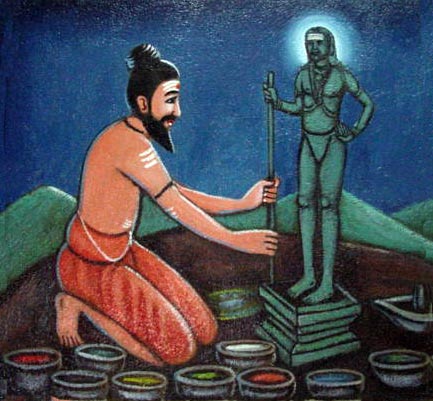Siddha Dispensary, Palani
 |
Siddha Munivar Bhogar formulated a clever mixture of nine poisonous metals, an amalgamation called nava pāsanam or 'nine minerals'. The idol for the presiding deity was sculpted out of this nava pāsanam. The poisonous nature of all these metals was harnessed, hardened like granite, and converted into a beneficial amalgam with medicinal and curative properties. |
The Siddha System of medicine is peculiar to Tamil Nadu and is believed to have been conceived by siddhars or evolved souls who lived in the hoary past. They either numbered 18 or there were 18 schools of siddhars. The siddhars were great doctors of medicine, philosophers, men with deep knowledge of anatomy and chemistry and savants, mystic saints and great seers noted for their wide travel, simple living and high thinking.
The Palani Hill, rich in herbs, was the abode of siddhars and has been known as cittan vāzhvu. The Siddha system of medicine flourished here. The Devasthānam has helped the preservation of this system by donating Rs. two lakhs to the Tamil Nadu Government for printing of rare manuscripts.
A full-fledged research-cum-teaching institution has been set-up in Madras and production of medicines undertaken. The recognition of the siddha system of medicine by the Government of India has also been a result of the Devasthānam's efforts.
Since 1964, a Siddha Dispensary is functioning in Dandapani Nilayam and curing skin diseases, jaundice and children's ailments. Working hours: 7.30 am to 10.30 am and 3 to 5 pm. On holidays, the dispensary functions only in the morning. The Devasthānam proposes to put up permanent buildings for the Siddha Dispensary.
|